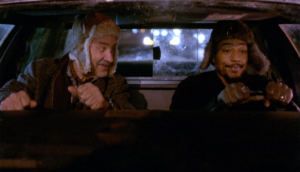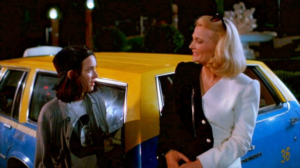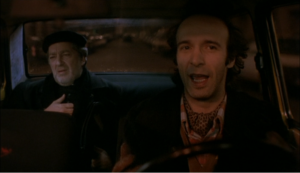Released in 1991, Jim Jarmusch’s Night on Earth is clearly not an American classic in the sense of belonging to the golden age of Hollywood. As an art film that aims to counter commercial Hollywood films, however, Night on Earth has acquired the status of a classic independent film by now. While the film’s production was comparatively inexpensive, it nevertheless impresses with a top-class cast of actors, including Winona Ryder, Gena Rowlands, Armin Mueller-Stahl, and Roberto Benigni as well as its reassuringly weird film music by Tom Waits.
In the film, five short scenes of cabdrivers and their passengers from Los Angeles, New York, Paris, Rome, and Helsinki are loosely connected through the banal recurrences of driving and riding taxis. In L.A., the tomboyish Corky (Winona Ryder) nonchalantly resists the offer of Ms. Snelling, the elegant casting agent (Gena Rowlands) to become an up-and-coming film star in order to pursue her dream of becoming a mechanic. In the New York episode, the African American Yo-Yo (Giancarlo Esposito) and the East German Helmut (Armin Mueller-Stahl) change positions, so that Yo-Yo drives and Helmut rides in order to make it safely to Brooklyn on a winter’s night. Along the way, Yo-Yo initiates Helmut into the beauties of New York both literally and figuratively as they ride through the lit-up city and pick up Yo-Yo’s resistant sister-in-law, Angela (Rosie Perez), to take her back to her husband.

In the Parisian taxi-encounter, a nameless driver (Isaach de Bankolé) throws his two African customers out, annoyed by their patronizing air towards his Ivory Coast heritage, only to annoy his next blind female passenger (Béatrice Dalle) with his own patronizing and judgmental questions about what it means to be blind. In Rome, a padre’s (Paolo Bonacelli) ride with the vivacious taxi driver Gino (Roberto Benigni) ends fatally for the man of God: While Gino confesses his past illustrious sexual sins, the increasingly agitated padre drops his medication and suffers a heart attack at the very moment Gino’s sexual confessions reach their climax. The final episode in Helsinki has driver Mika (Matti Pellonpäa) transport three friends (Kari Väänänen, Sakari Kuosmanen, Tomi Salmela) back home after they have drowned their sorrows over Aki’s loss of his job, wife, and home. Mika, however, has been through worse, he says. Thus begins his story about the premature birth and death of his daughter, bringing tears to his passenger’s eyes. All of these five stories are linked by a repeated use of extradiegetic film materials, which show a bank of clocks and a rotating globe, suggesting the simultaneity of the events.
These summaries sound like spoiler alerts, but let me assure you that they can in no way preempt the pleasures of watching the film – its variations of subtle and raucous humor alongside the film’s melancholy, darker insights about cultural differences on the one hand and commonalities of human experiences and sorrows on the other. Nor do my summaries capture the film’s poetic cinematography of the selected, recognizable Western cityscapes by night, the outstanding acting of the conflicts and intimacies that develop among drivers and passengers, or the repetitive and moody, yet upbeat music by Tom Waits.
I have always read the film as an homage to diversity. Even though each of the scenes heavily relies on regional and national stereotypes, it also subverts them. For instance, the traditional narrative of the experienced businessman meeting the working-class youth whose dreams are not to be corrupted by fast money, is here re-enacted by two women. What is more, the experienced casting agent Ms. Snelling, who seems wedded to her phone as a symbol of showbiz made in Hollywood, turns out to possess a sense of humor and sincerity, which belies the stereotype of the American capitalist driven by ambition and money. Corky’s language and mannerisms, on the other hand, demonstrate that this young taxi driver is far from an ‘innocent’ young woman.

I like the Paris episode for exposing that racism comes to us in all shapes and skin colors and, what’s more, for the character of the nameless, sexy, self-confident, and wonderfully quick-witted nameless blind passenger. But my all-time favorite encounters take place in New York and Rome. In New York, the humorous cinematic portraits of the unlikely pairs open up fleeting moments of intimacy among strangers who relate to each other across their class, gender, and race differences as well as their language barriers and individual experiences.
Although a taxi ride of a padre in Rome is perhaps the most banal of all things, Roberto Benigni’s brilliant acting and outstanding comical talent render this scene the climax of unlikely transatlantic encounters and existential absurdity in this 5‑episode tragicomedy. By now, the driving has become riskier and the action has gained a faster pace – if one can speak of fast action at all in a film in which action exhausts itself in changes from close shots to two-shots, witty dialogues, and extreme long shots of driving taxis, which alternate with somewhat shaky views from inside the taxi out into the various cityscapes by night. The contrast between Gino’s vivid imagination, exuberance, and peculiar erotic experiences with the ailing, tight-lipped, and buttoned-up padre is repeated in Gino’s affectionate greeting of the transvestites in one of Rome’s red-light districts, whose curious gazes at his passenger greatly elevate the padre’s unease and blood pressure.

The final episode in Helsinki provides not only the anti-climax, but perhaps the most haunting of all five stories. Here, Roman matters of love and death evolve into Finnish stories of human tragedy, including Aki’s loss of job, home, and family as well as Mika’s loss of his newborn daughter. In the end, Jim Jarmusch’s cinematic taxi allegory seems to suggest, we are all passengers on a both riveting and sorrowful, but ultimately temporary ride on this planet.
24,368 Total Views, 13 Views Today






